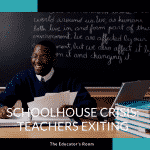Following recent events, it’s impossible not to recognize how divided our nation has become. We as teachers have our own unique and individual opinions based on our own experiences and education, and so do our students. But what happens when events taking place are so prominent that it would be a disservice to students to brush it under the rug?
Teaching contemporary issues and solutions to high school seniors for almost 5 years now, it has been equally a pleasure and a curse. This course and I have a love hate relationship. I love how the content is ever-changing, how relevant it is to students lives, and how amazing the products are that I get from my students; however, I have always hated being the sounding board to uneducated and sometimes aggressive opinions. How does a teacher respectfully handle those opinions? And on the fly in front of a room full of students?
[bctt tweet=”I have always hated being the sounding board to uneducated and sometimes aggressive opinions. ” username=””]
Stick to the Facts
What I’ve learned, is to open up with the cold hard facts and then always refer back to the facts. When teaching gender this past year, before I assigned anything opinion based, we viewed the documentary Gender Revolution from National Geographic. Katie Couric does a fantastic job taking her audience into the lives of those who are transgender and dissects the actual meaning of gender and sexuality. Exposing nothing but the facts, the film begins the journey by taking a look at scientifically what happens in the womb, then continues with interviews of multiple examples of gender throughout different stages of life.
Guide Students to Empathize
During the documentary, I wanted my students to do more than just answer recall questions, I wanted them to get the big idea. While there are many big ideas one can pull from gender equality, I chose to focus on acceptance. This was something that my students could all relate to, no matter their age, gender, sexuality or socio economic status, they were in high school and they had all experienced craving acceptance. While viewing the documentary, students focused on what it meant to be accepted and why they thought people wanted it. This gave students a way to relate to an idea that was unfamiliar to them. According to Sue Shellenbarger from the Wall Street Journal, “understanding others’ viewpoints takes more conscious effort for teens, while it becomes automatic for adults, Dr. Blakemore says. Perspective-taking continues to develop through age 21.” Knowing that empathy takes more effort from teenagers than it does from adults, we can help encourage it to help them better understand topics that may not directly affect them.
Conduct Additional Research
After delivering the facts and helping students to empathize, that’s when students are prepared to conduct additional research from multiple texts, which helps develop and strengthen opinions. Show students how having multiple sources helps to strengthen an argument, even if they don’t agree with the content, they should understand why it’s important to have. We know that the best arguments are well-rounded and are able to recognize the other side, but can our students comprehend the importance that?
Expressing Opinions
Whether it’s in the form of an essay or Socratic seminar, students deserve the right to express their opinions and to be heard. The dangers of opening up the floor to a discussion without delivering facts is that feelings can get hurt and information can be skewed or even wrong. Our students should have the opportunity to discuss topics such as the banning of people who are transgender in the military; this is their world too and discussing these issues brings us all closer to a solution. But as teachers, we have to give students the tools to discuss the issues properly, with facts and with empathy.
Leaving our own opinions at the door and waiting for students to come to their own conclusions is most certainly difficult, but the worst thing we can do is force a student to get their by imposing opinions. A bias teacher either makes students believe something without fully understanding the reason, or causes a student to be oppositional. We have to trust that students with a wealth of facts are prepared to argue with the right ammo. While watching the news can be difficult to swallow, at the end of the day we have a room full of students to face and difficult questions to answer. With the right tools and their best interest at heart, the only thing we can do is our best and hope that our students embrace the world in a loving and accepting way.








Very nice. Thank you for the Gender Revolution resource.